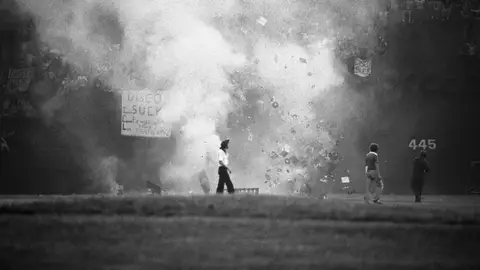Can We Talk About...? Disco Demolition Night, the Original Straight Pride

Can We Talk About...? is a weekly series dedicated to voguing the house down.
There's a moment in the latest episode of Pose when Pray Tell makes a brief mention of records being blown up in a baseball stadium as part of a backlash to disco—proof that the ballroom scene would and could never go mainstream.
He's referring to July 12, 1979, otherwise known as Disco Demolition Night at Chicago’s Comiskey Park. On that fateful evening, which will live on forever in our messy history, what started out as a radio promotion turned into a full-on riot that would allegedly mark the death of disco. Now, 40 years later, the Chicago White Sox decided to commemorate this death with some free T-shirts.
As the story goes, rock shock jock Steve Dahl, who was fired in 1978 when his rock and roll station switched over to disco, had an ax to grind. When asked about his hatred of disco, Dahl, in an old news clip, cites his aversion to piña coladas and gold jewelry. To him, disco was exclusionary, elitist, and superficial. The fact that rock bands like The Rolling Stones, Kiss, and the Windy City's own Chicago had dabbled in the genre—to mostly disastrous results—probably didn't help Dahl catch that Saturday night fever.
The struggling White Sox sold out a doubleheader on Dahl's promise to blow up a crate full of disco records, with at least 20,000 people left clamoring outside the stadium parking lot. Though the event was designed to destroy disco LPs and 45s, an usher who was there that night noted men also bringing in records that were simply made by black artists. Between games, Dahl detonated the discs, and because an explosion in the middle of a grassy knoll never ends well, all hell broke loose. The rowdy Sox fans-cum-disco haters stormed the field, rendering it unusable for play, and the Sox had to forfeit their second game to the Detroit Tigers.
So this week, for some strange reason, the White Sox wanted to pay tribute to what was basically a riot with racist and homophobic overtones—right in the middle of Pride Month.
What's to celebrate exactly? The White Sox forfeiting one game after losing the first one earlier that day? Disco Demolition Night wasn't a proud moment in sports or Chicago history. But perhaps this Twitter user put it best: "Disco Demolition Night was the original Straight Pride Parade."
Straight pride, after all, is nothing more than a juvenile reaction to queer liberation perpetrated by straight white men who resent the perceived erosion of their longstanding dominance in America. Though Dahl doesn't see it that way.
“We blew up disco records, made fun of the Bee Gees and Saturday Night Fever. It goes no deeper than that,” Dahl said in an email to the Chicago Tribune. “Perception is not always reality. Especially when that perception uses the prism of today to look at events 40 years ago. Sometimes a stupid radio promotion is just a stupid radio promotion.”
"Perception is not always reality"? Let's not do that. Let's not play this game of undermining legitimate concerns by playing fast and loose with the truth, because this isn't just an example of neoliberal revisionist history born of the age of reckless political correctness.
Just six months after Disco Demolition Night, Rolling Stone's Dave Marsh clocked the backlash for exactly what it was:
White males, eighteen to thirty-four, are the most likely to see disco as the product of homosexuals, blacks and Latins, and therefore they’re most likely to respond to appeals to wipe out such threats to their security. It goes almost without saying that such appeals are racist and sexist, but broadcasting has never been an especially civil-libertarian medium.
Disco was the music of and for gay people and people of color; at its best, it was the sound of liberation and a direct reflection of the strides towards acceptance that we made with the first Pride celebrations beginning in 1970. Take, for instance, this brazen 1975 gem from The Miracles, "Ain't Nobody Straight in L.A.":
Or Carl Bean's 1977 proto-gay anthem, "I Was Born This Way":
The inherent queerness and blackness of disco proved a threat to the straight white mainstream, who nonetheless embraced it, co-opted it, and then proceeded to ruin it. But the news of disco's death was gravely exaggerated. A year after Disco Demolition Night, Diana Ross topped the charts with her biggest-selling album to date, the disco-heavy diana, featuring the quintessential gay anthem "I'm Coming Out."
Soon after, while white rock fans were chanting "Disco sucks!," black, Latino, and queer Chicagoans were getting down to the nascent house music pioneered by New York transplants Robert Williams and Frankie Knuckles at the Warehouse dance club in the city's West Loop neighborhood. Knuckles, who had served as the in-house DJ at New York's Continental Baths, helped make the Warehouse the epicenter of Chicago's black gay nightlife scene, and soon people from all walks of life gravitated towards it.
Knuckles called house music "disco's revenge," which couldn't be truer given that the genre and its offshoots are now far more popular and pervasive than rock. Disco lives on in basically every form of pop music, having formed the roots of both hip hop and EDM, which dominate the charts today. Anytime you hear a four-to-the-floor beat or a soulful vocal sample, you're listening to the fruits of disco.
It's disco's house, and we all (still) live there.





